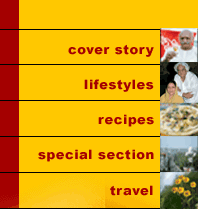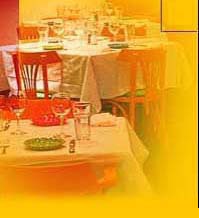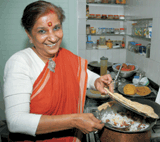


|
Cooking is like Painting
Rini Dhumal, Baroda�s famous painter, is an equally gifted cook. UpperCrust samples both, her art and her cooking at her studio home in the old city. |
|
But this is about the other Rini, the one in whom all of Baroda recognises an outstanding cook! Both the artist and her husband, Purshottam Dhumal, who is also an artist, are reckoned to be fantastic in the culinary arts as well. He is a Maharashtrian from Kolhapur, and cooks all kinds of non-vegetarian food like meat and chicken and biryani. She is a Bengali from Bangladesh, and her speciality is fish. Naturally! When the Dhumals are entertaining at home, Rini and Purshottam both cook! Rini is one of Salman Rushdie’s Midnight Children, she was born in Rangpur, East Bengal, in 1948. Her father was working for the government, as chairman of Shell International, that later became Indian Oil Corporation, and his work brought him to Bombay, Baroda, Delhi. Rini studied at Santiniketan, then Baroda and Paris. But she remains as Bengali as the fish she specialises in cooking. In this case for the UpperCrust, it was the Hilsa, in a mustard preparation. But when the Hilsa is not available in Baroda, Rini uses the Pomfret or Rohu. She also cooked the popular Bengali speciality Chingri Malai Curry, using estaury tiger prawns for the dish, and a Mutton Biryani for which the recipe was provide long-distance over the phone by husband Purshottam! “I don’t know where he got it from, but he instructed me how to do it,” she admits.
Rini also prepared a Bharela Baingan of Gujarati origin, but stuffed the aubergine with fried masala and dahi. And, for dessert, there was Bengali sweets Rosogulla and Payesh, made of date and jaggery and cooked rice. “Bengalis like non-vegetarian food,” she announces from the kitchen, “but our recipes are easy, and each family has its own way of cooking a particular dish. The food of East Bengal is also different from that of the West. It is, All her recipes, Rini says, are East Bengal family recipes. She picked up cooking when she was young and used to assist her mother in making the sweets at home. “You have to have good tastes and an encouraging family, then it comes automatically, you don’t have to spend much time actually learing how to cook,” says Rini. Fortunately, her mother and grandmother were fantastic cooks and she picked up the skill.
Now she cooks at home for family and friends. Whenever the menu requires something of Bengali cuisine in it, Rini does the cooking. “I notice our cook do not pick up my recipes. But when my husband tells her his Maharashtrian recipe for Kolhapuri Mutton and Biryani, the cook picks it up quickly!” The husband and wife divide the home cooking between them. He will do the mutton and chicken dishes; she the fish and sweets. When they entertain Baroda friends, which is often, then both cook! “We decide what we want to do. We have a good rapport in the kitchen. We used to work in the Maharaja Sayajirao University together, in the same department, as husband and wife for 22 years. I was professor and head of teh department. Then I resigned, because I have my own work to do,” she says.
Ask her who is the better cook, she or Purshottam, and Rini hesitates. “I thibk he is — but I don’t know. He thinks he is better! He is a Maratha. They think they are good at everything. But I like his food. He doesn’t cook everyday. He doesn’t have time. But on Sundays and holidays, he loves getting into the kitchen. I think cooking is like painting. If you are a good artist, you are a good cook. Anjolie Ela Menon, Jatin Das, they are also good cooks. You use your heart in both, cooking and painting. The hand knows how much colour to use, how much oil, spices to add, and when to stop!” |

Home Page
 RINI Dhumal, one of India’s leading artists who has held several solo and group shows domestically and abroad, and who is internationally recognised, now lives, paints, sculpts and also teaches in the city of Baroda. Her subjects are invariably women, and they ar centre-stage, flanked by strange looking cats or fishes, or dramatic flowers and assorted plumage. Her paintings, critics say, open the door to the less bleak image of art, and to life itself. That is Rini the artist.
RINI Dhumal, one of India’s leading artists who has held several solo and group shows domestically and abroad, and who is internationally recognised, now lives, paints, sculpts and also teaches in the city of Baroda. Her subjects are invariably women, and they ar centre-stage, flanked by strange looking cats or fishes, or dramatic flowers and assorted plumage. Her paintings, critics say, open the door to the less bleak image of art, and to life itself. That is Rini the artist.